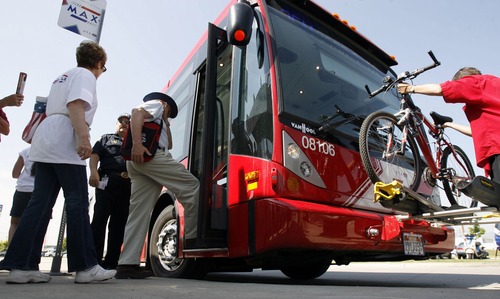This is an archived article that was published on sltrib.com in 2013, and information in the article may be outdated. It is provided only for personal research purposes and may not be reprinted.
The Utah Transit Authority — amid controversy over six-figure pay and hefty bonuses for executives — is cutting the pay scale for some employees.
The cut is not for executives, but for some part-time bus drivers. The labor union that represents them contends the move violates its collective bargaining agreement, and says it will file a grievance if UTA proceeds.
The part-time drivers often work an hour or two in the morning, and again in the evening to help with rush-hour routes. They had been paid a two-hour minimum each time they showed up to work. But as of Aug. 18 — one of three days a year when route schedules change — UTA says they will be paid for exactly what they work. If they work an hour, they will be paid for an hour.
UTA spokesman Remi Barron said the practice of paying a two-hour minimum was an error.
"Previously there was confusion about our obligation to part-time employees, and short-trips out of the downtown garage were incorrectly paid a two-hour minimum. In preparation for [the] August change day, we corrected the situation and clarified to the part-time employees that they will be paid for the time worked," he said.
Joe Hatch, lawyer for Amalgamated Transit Union Local 382, said UTA has always paid a two-hour minimum for the part-timers. "The union heard that the company was unilaterally going to switch it," he said. "The union informed the company that they believe that to be a violation of established practice of collective bargaining," and will file a grievance if it proceeds.
Amid the change, Barron said part-timers were given the opportunity to select pieces of work that are greater than two hours at a time — but not all chose to take them. With that offer, he said, "UTA is not reducing compensation for part-time operators or other employees this change day."
Some bus drivers affected notified The Salt Lake Tribune about the change, but did not want names used because UTA policy bans employees from talking to the press without permission — and they could be fired for doing so.
The drivers said the change could significantly reduce their pay because they often work an hour and a half or less in the morning and afternoon. They said they had always been paid a two-hour minimum, but acknowledge that language in contracts technically called for paying them the exact hours worked.
Barron said UTA has worked hard to make shifts available that are at least two hours long for the part-timers. "All part-time operators had the opportunity to select pieces of work greater than two hours."
Barron said only three part-time drivers voluntarily selected work that is less than two hours. He said a couple other drivers have not yet selected their schedules, waiting to see what is left over from full-time operators — which could end up giving them longer shifts.
Depending on seniority, part-time operators earn between $14.13 and $19.27 an hour, Barron said, the same range as full-time operators. He said many of them prefer part-time work because of their personal situations, but many other also eventually work into full-time positions.
The change for part-time drivers comes as critics of UTA have attacked the pay, bonuses and travel of top executives, and rider groups warned last week that negative public perception is a problem UTA should do more to address.
The Tribune recently reported that last year, top UTA executives split $750,000 in bonuses for meeting goals that critics say were too easy to achieve. Top bonuses included $25,000 each to UTA General Manager Michael Allegra and General Counsel Bruce Jones.
Overall compensation for executives is high compared to other transit agencies, a past state audit found. Total 2012 compensation, including salary and benefits, was $365,763 for former UTA CEO John Inglish; $332,604 for Allegra; $329,616 for former Chief Financial Officer Kenneth Montague; and $312,794 for Jones, according to utahsright.com.
Meanwhile, union employees have not received a pay raise since October 2011, Hatch said, as the union and UTA have tried to negotiate a new collective bargaining agreement.



